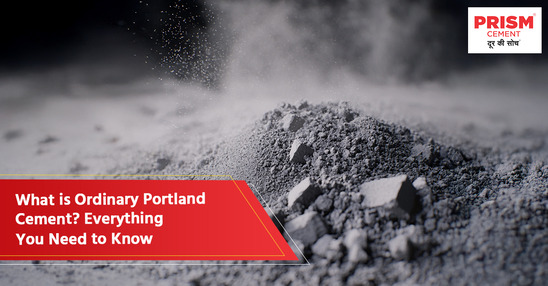
Ordinary Portland Cement (OPC Cement) is the most common type of cement used in construction worldwide. It's a hydraulic cement, implying that it sets and hardens when mixed with water. In this informative blog you will get the answer to the questions - What is Ordinary Portland Cement and What is the difference between OPC and PPC cement?
The history of cement dates back to ancient times, with the Romans using lime-based mortars. However, modern Portland cement, as we know it today, was invented in the early 19th century by Joseph Aspdin. He named it after the natural cement found on the Isle of Portland in England.
OPC is primarily composed of four main ingredients:
The production of OPC involves several key steps:
OPC is classified based on its compressive strength at 28 days:
Portland Pozzolana Cement (PPC) is another type of cement that is gaining popularity due to its enhanced properties. While OPC is primarily composed of clinker, PPC incorporates pozzolanic materials like fly ash or silica fume.
| Feature | OPC | PPC |
| Composition | Primarily clinker | Clinker + pozzolanic materials |
| Strength | High initial strength | Lower initial strength but higher long-term strength |
| Durability | Good durability | Excellent durability, especially against sulfate attack |
| Heat of Hydration | Higher heat of hydration | Lower heat of hydration |
| Environmental Impact | Higher carbon footprint | Lower carbon footprint due to the use of pozzolanic materials |
Advantages:
Disadvantages:
The cement industry is a major contributor to greenhouse gas emissions, primarily due to its energy-intensive manufacturing process. However, efforts are being made to reduce the environmental impact of cement production through various strategies, such as:
When selecting the best cement for your project, it's essential to consider factors such as strength requirements, setting time and environmental impact. Consulting with a construction professional can help you choose the best cement for your specific needs.
If you're looking for the best cement for roof slabs, you might consider using a high-strength cement to ensure the structure's durability. By understanding the basics of cement and the various types available, you can make informed decisions to build strong and sustainable structures.
Prism Cement offers a range of premium quality cement products to suit various construction needs. Known for its rapid strength gain, Prism Champion All Weather cement is ideal for projects requiring quick completion, such as plastering. It also offers excellent workability and water resistance. Check out our full range of products here.
Prism Cement a division of Prism Johnson Limited is one of India’s leading integrated Building Materials Company, with a wide range of products from cement, ready-mixed concrete, tiles and bath products.
Prism Johnson Limited is an IMS Certified Company (ISO 9001:2015, ISO 14001:2015, ISO 45001:2018,SA 8000:2014 & ISO 50001:2018). Quality assurance is an integral part of Prism Johnson Limited manufacturing philosophy. The strength and other characteristics are much higher than the BIS requirements. Excellent quality has placed Prism Cement in the premium price segment.
KNOW MORE305, Laxmi Niwas Apartments, Ameerpet,
Hyderabad - 500016, Andhra Pradesh
![]() Tel: +91-40-23400218
Tel: +91-40-23400218
![]() Fax: + 91-40-23402249
Fax: + 91-40-23402249
"Rahejas", Main Avenue, V.P. Road,
Santacruz (W), Mumbai - 400054,
Maharashtra
![]() Tel: +91-40-23400218
Tel: +91-40-23400218
![]() Fax: + 91-40-23402249
Fax: + 91-40-23402249